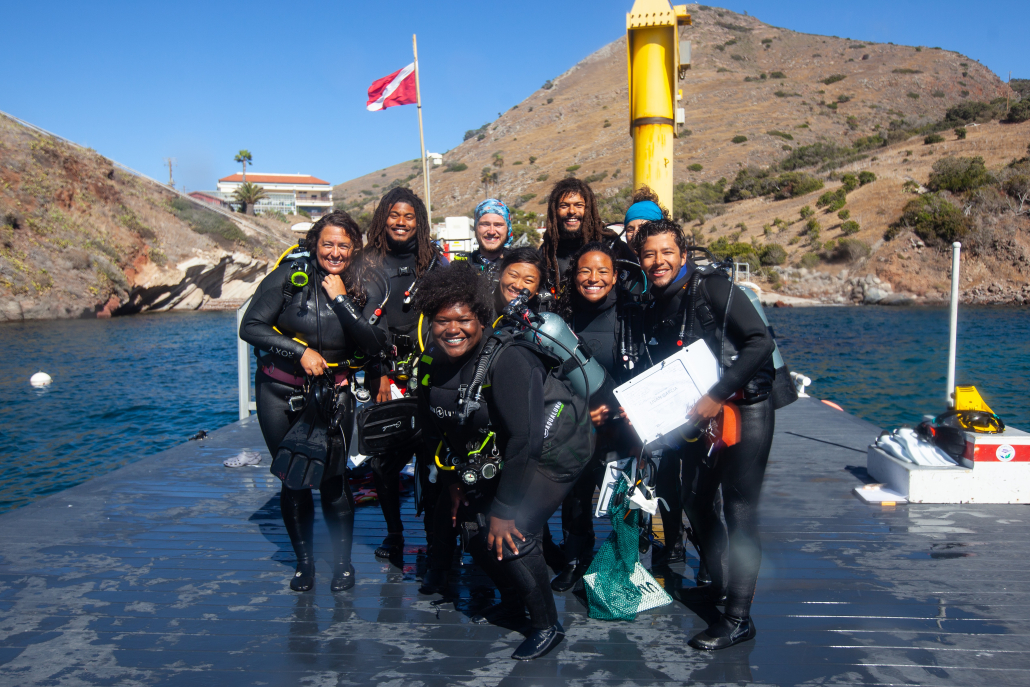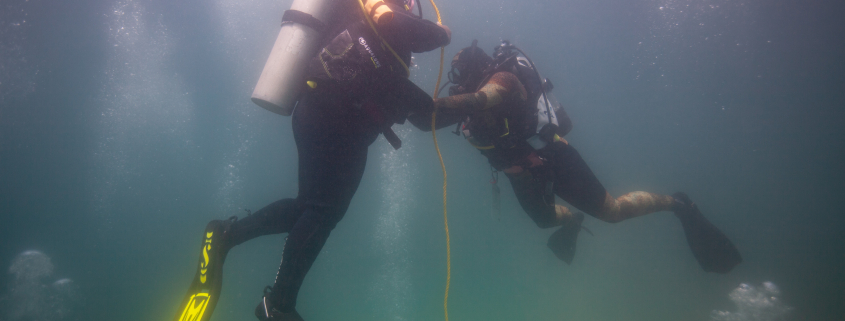Wrigley program takes students to new depths

After competing as a finalist for the Wrigley Sustainability Prize, Marcela Riddick decided to pursue scuba diving, a skill useful for careers relating to sustainability and environmental science. Riddick, however, didn’t see herself represented in the skill: Only about 31% of scuba divers are women and less than 32% are non-white, according to Zippia.
“There’s not a lot of people [who] look like me [in the scuba diving community],” Riddick said. “There’s not a lot of women divers [and] not a lot of Black and Brown divers.”
The Scientific Diving Discovery Program at the USC Wrigley Institute for Environmental Studies aims to change that. The program teaches scuba diving and underwater research techniques to mostly undergraduate students from underrepresented backgrounds. Lasting three weeks, it hosted its first cohort on Catalina Island this past summer.
Riddick, a USC alumnus and education assistant for the Wrigley Institute, helped with programming during scuba diving excursions.
“Bringing in and starting a new generation of diverse [scuba] divers is really important in making a more inclusive community,” Riddick said. “It’s also super, super fun.”
John Heidelberg, director of the Wrigley Marine Science Center and professor of biological sciences and environmental studies, was a co-principal investigator for the program.
Heidelberg was inspired to begin the program because scuba diving is not an accessible skill for many, he said, as it’s expensive and relies greatly on one’s geographic location. Heidelberg said he wanted students to benefit from peer learning in an experiential cohort.
“USC is a hub of experiential learning,” Heidelberg said. “For students, being out on the island [and] being away [from] many distractions really does make that experiential learning. [It is] truly life changing.”
The cohort was composed of seven students from institutions across the United States, including Florida A&M University, Old Dominion University and Texas A&M University. California institutions were also represented, including California State University Long Beach, University of California Santa Cruz and Los Angeles Valley College.
Students began the program by completing prerequisites — such as their open water certification and medical clearance — prior to arriving on Catalina Island. While on the island, students completed approximately 20 scuba diving sessions, including free dives, deep dives and night dives.
Hanna Reed, diving safety officer at the Wrigley Marine Science Center, assisted with teaching diving elements and writing the grant application for the program. Reed was inspired to help students earn a job after completing the program.
“A huge focus of this [program] was breaking down barriers,” Reed said. “It’s already hard enough to break into a STEM field. If you throw in diving on top of it, the financial barriers are incredible.”

Scuba diving requires a financial commitment, as each diver requires individual gear. The program funded approximately half of the cohort’s gear this summer.
“We want to really give underrepresented minority students a tangible asset that they can take with them into the workforce or into graduate school,” Heidelberg said.
The cohort had the opportunity to earn their American Academy of Underwater Sciences Scientific Diver authorization, professional-level CPR certification and Advanced National Association of Underwater Instructors Scientific Divers certification during the program.
Guest speakers from the USC Career Center and the Dornsife College of Letters, Arts and Sciences added a career development aspect to the program, speaking to students about how to present their scuba diving skills on a resume and during interviews.
A grant from the National Marine Sanctuaries Foundation to increase diversity in the scuba diving field funded the Scientific Diving Discovery Program. The Wrigley Institute intends to hold the program annually and is fundraising to triple the number of students in next year’s cohort and provide scuba diving gear for every student.
“I want these students to know that there’s a place for them in the [scuba diving] industry,” Reed said. “My goal is to make space [and] create divers that are going to inspire future generations.”

